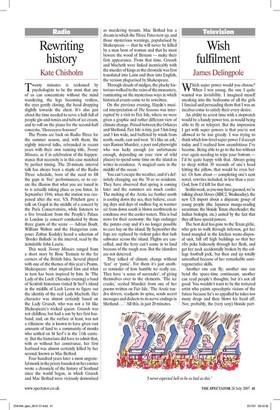Rewriting history
Kate Chisholm wenty minutes is reckoned by psychologists to be the most that any of us can concentrate without the mind wandering, the legs becoming restless, the eyes gently closing, the head dropping slightly towards the chest. It's also just about the time needed to serve a hall-full of people gin-and-tonics and tubs of ice cream, and to roll on the piano for the second-half concerto, `Heeeeeave-h00000!'
The Proms are back on Radio Three for the summer season, and, with them, the nightly interval talks, rebranded in recent years with their own running title, Twenty Minutes, as if in celebration of the happenstance that necessity is in this case matched by perfect timing. The 20-minute interval talk has always been a staple of the Radio Three schedule, born of the need to fill the gaps in 'live' performances, or to create the illusion that what you are tuned in to is actually taking place as you listen. In September 1946, when the station was reopened after the war, VS. Pritchett gave a talk on Gogol in the middle of a concert by the Paris Conservatoire, while listeners to a live broadcast from the People's Palace in London (a concert conducted by those three giants of the scene — Adrian Boult, William Walton and the Hungarian composer Zoltan Kodaly) heard a selection of 'Border Ballads' in the interval, read by the inimitable John Laurie.
This week Twenty Minutes ranged from a short story by Rose Tremain to the far corners of the British Isles. Several played with one of the themes of this year's Proms, Shakespeare: what inspired him and what in turn has been inspired by him In 'The Lady of the Loch' (Tuesday evening) a band of Scottish historians visited St Serf's island in the middle of Loch Leven to figure out the identity of the real Lady Macbeth. Her character was almost certainly based on the Lady Gruoch, who was not a bit like Shakespeare's wicked queen. Gruoch was not childless, but had a son by her first husband, and, on the surface at least, was not a villainess: she is known to have given vast amounts of land to a community of monks who settled on St Serf's in the 11th century. But the historians did have to admit that, with or without her connivance, her first husband was almost certainly killed by her second, known as Mac Bethad.
Four hundred years later a most ungrateful monk in the priory founded on her estates wrote a chronicle of the history of Scotland since the world began, in which Gruoch and Mac Bethad were viciously demonised as murdering tyrants. Mac Bethad has a dream in which the Three Fates turn up, and those mysterious warnings, popularised by Shakespeare — that he will never be killed by a man born of woman and that he must beware the wood of Birnam — make their first appearance. From that time, Gruoch and Macbeth were linked inextricably with the murder of kings as the chronicle was first translated into Latin and then into English, the version plagiarised by Shakespeare.
Through clouds of midges, the plucky historians walked to the ruins of the monastery, ruminating on the mysterious ways in which historical events come to be rewritten.
On the previous evening, Haydn's musical interpretation of The Seasons was interrupted by a visit to Fair Isle, where we were given a graphic and rather different view of climate change. Poised between the Orkneys and Shetland, Fair Isle is tiny, just 5 km long and 3 km wide, and buffeted by winds from north, south, east and west. 'It's like an ark,' says Raman Mundair, a poet and playwright who was lucky enough (or unfortunate enough, depending on your view of wild places) to spend some time on the island as writer-in-residence. 'A magical oasis in the middle of the ocean.'
You can't escape the weather, and it's definitely changing, say the 70 or so residents. They have observed that spring is coming later and the summers are much cooler. The melting of the Arctic ice further north is cooling down the sea, they believe, creating days and days of endless fog as warmer air from down south is blown northwards to condense over the cooler waters. This is bad news for their economy: the fogs endanger the potato crop and it's no longer possible to cure hay on the island. By September the fogs are replaced by violent gales that lash saltwater across the island. Flights are cancelled, and the ferry can't come in to land because of the rough seas. But the islanders are not deterred.
They talked of climate change without 'fear' or 'panic'. For them it's just another reminder of how humble we really are. They have 'a sense of surrender', of giving themselves over to the elements. 'The ice cracks,' recited Mundair from one of her poems written on Fair Isle. 'The Arctic tundra shivers, readjusts its spine, sends secret messages and dialects to its nerve endings in Shetland ... ' All this, in just 20 minutes.








































 Previous page
Previous page